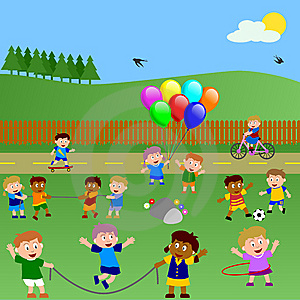This is the picture of playground. Look at the picture and describe the different activities the children are engaged in. Also answer the questions given below:
- How many children are there in the park?
- Name the different games the children are playing in the park?
- Who is holding the balloons?
- How many boys are there on the slide?
- Is it a cold day or a bright, sunny day?
- Can you see a sidewalk in the park?
- What are the children doing there?
- Do you have a park near your house?
- What games do you play there?
- With whom do you go to the park – with your friends or your parents or by yourself?
- Describe the park you go to and the games you play there?

